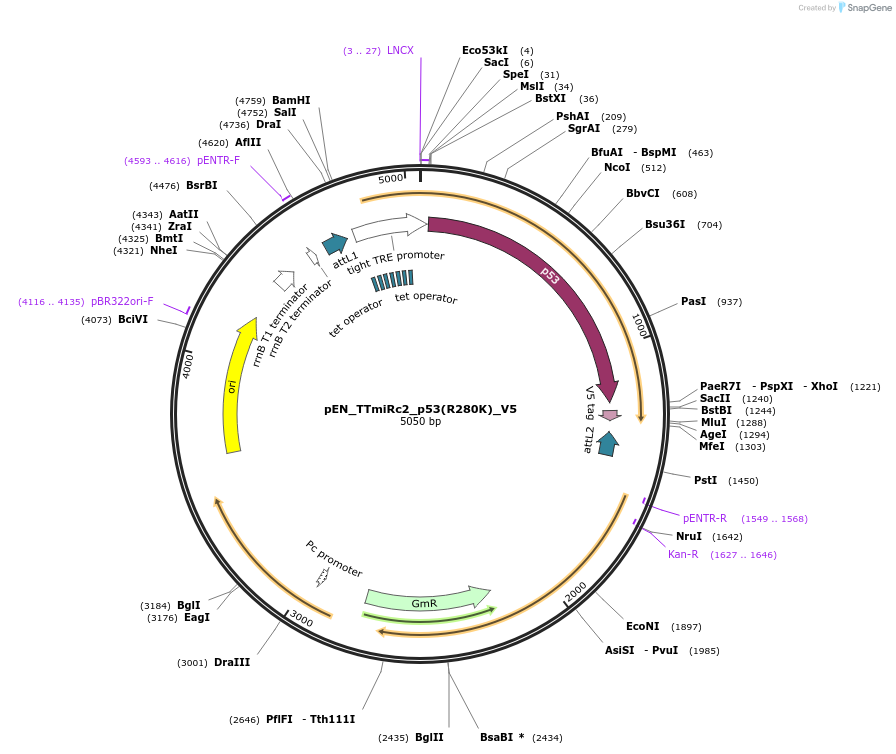pEN_TTmiRc2_p53(R280K)_V5
(Plasmid
#136525)
-
PurposeUsed as a donor vector to clone into pSLIK
-
Depositing Lab
-
Sequence Information
Ordering
| Item | Catalog # | Description | Quantity | Price (USD) | |
|---|---|---|---|---|---|
| Plasmid | 136525 | Standard format: Plasmid sent in bacteria as agar stab | 1 | $89 | |
Backbone
-
Vector backbonepEN_TTmiRc2
-
Backbone manufacturerAddgene #25752
- Backbone size w/o insert (bp) 4422
-
Vector typeentry vector for gateway cloning
Growth in Bacteria
-
Bacterial Resistance(s)Gentamicin, 10 μg/mL
-
Growth Temperature37°C
-
Growth Strain(s)ccdB Survival
-
Copy numberUnknown
Gene/Insert
-
Gene/Insert namep53(R280K)
-
SpeciesH. sapiens (human)
-
Insert Size (bp)1278
-
Mutationp53(R280K)V5 was cloned from pLenti6-p53-R280K-V5 plasmid from Addgene (plasmid #22933) with SpeI and MfeI 5' and 3' sites, respectively. There is a C --> G polymorphism at base pair 215 in ORF (corresponding to codon 72- switching from a proline to an arginine). This base pair substitution was encoded in the insert in the pLenti6 plasmid obtained from Addgene and is a common sequence polymorphism observed in p53.
-
GenBank IDNM_000546
-
Entrez GeneTP53 (a.k.a. BCC7, BMFS5, LFS1, P53, TRP53)
-
Tag
/ Fusion Protein
- V5 (C terminal on insert)
Cloning Information
- Cloning method Restriction Enzyme
- 5′ cloning site SpeI (not destroyed)
- 3′ cloning site MfeI (not destroyed)
- 5′ sequencing primer TGATAGAGAACGTATGTCGAGG
- (Common Sequencing Primers)
Terms and Licenses
-
Academic/Nonprofit Terms
-
Industry Terms
- Not Available to Industry
Trademarks:
- Zeocin® is an InvivoGen trademark.
These plasmids were created by your colleagues. Please acknowledge the Principal Investigator, cite the article in which the plasmids were described, and include Addgene in the Materials and Methods of your future publications.
-
For your Materials & Methods section:
pEN_TTmiRc2_p53(R280K)_V5 was a gift from Kevin Janes (Addgene plasmid # 136525 ; http://n2t.net/addgene:136525 ; RRID:Addgene_136525) -
For your References section:
Sporadic activation of an oxidative stress-dependent NRF2-p53 signaling network in breast epithelial spheroids and premalignancies. Pereira EJ, Burns JS, Lee CY, Marohl T, Calderon D, Wang L, Atkins KA, Wang CC, Janes KA. Sci Signal. 2020 Apr 14;13(627). pii: 13/627/eaba4200. doi: 10.1126/scisignal.aba4200. 10.1126/scisignal.aba4200 PubMed 32291314



